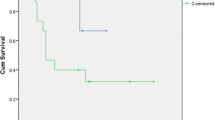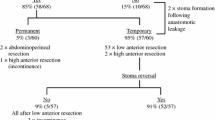Abstract
PURPOSE: Mesorectal involvement is a common feature in rectal tumors. Neoplastic foci can be identified at pathologic examination of the mesorectum, but their incidence and prognostic significance remain to be defined. METHODS: A series of 77 patients with extraperitoneal rectal cancer, resected with total mesorectal excision, entered the study. After fixation, the excised specimens were submitted to serial transverse sections and staining. Direct tumor infiltration, lymph node involvement, and neoplastic microfoci in the mesorectum were investigated. Patients with mesorectal foci were compared with those without deposits with regard to clinical and pathologic parameters; different patterns of foci (endovasal, endolymphatic, perineural, isolated) were also considered. Univariate and multivariate analyses were used to evaluate the impact on survival rate. RESULTS: Neoplastic mesorectal involvement was found in 64 patients (83.1 percent). Direct tumor infiltration was detected in 66.2 percent, node involvement in 28.6 percent, microscopic foci in 44.2 percent of cases (endovasal in 11.7 percent, endolymphatic in 15.7 percent, perineural in 26 percent, isolated in 14.3 percent). In 7 cases (10.9 percent) microfoci alone (without any kind of other mesorectal involvement) were detected. Deposits were found in 18.8 percent of TNM Stage I tumors, in 46.9 percent of Stage II and in 59.3 percent of Stage III cancers. Similar incidence was found in patients treated with integrated therapies and surgery alone (43.3 vs. 44.7 percent, P = not significant). Poorer median (44.5 vs. 57 months, P = 0.04) five-year overall survival rate (43.4 vs. 63.3 percent, P = 0.016) and disease-free survival rate (43.3 vs. 57.7 percent, P = 0.048) were observed in patients with microscopic foci compared with those without deposits. Tumor configuration was found to be a independent prognostic factor for both overall and disease-free survival rates; furthermore, endolymphatic, perineural, and isolated foci significantly affected overall survival rate, while TNM staging affected disease-free survival rate. CONCLUSIONS: The incidence of neoplastic foci in the mesorectum is high, even in early staged tumors and despite aggressive preoperative treatment. They seem to affect prognosis. Such features should, therefore, be considered when local excision of the tumor is planned. Presence of mesorectal foci should modify conventional staging of the rectal tumor.
Similar content being viewed by others
References
JV Reynolds WP Joyce J Dolan K Sheahan JM Hyland (1996) ArticleTitlePathological evidence in support of total mesorectal excision in the management of rectal cancer Br J Surg 83 1112–1115
N Scott P Jackson T al-Jaberi MF Dixon P Quirke PJ Finan (1995) ArticleTitleTotal mesorectal excision and local recurrence Br J Surg 82 1031–1033
JK MacFarlane RD Ryall RJ Heald (1993) ArticleTitleMesorectal excision for rectal cancer Lancet 341 457–460
RJ Heald (1988) ArticleTitleThe’ Holy Plane’ of rectal surgery J R Soc Med 81 503–508
K Suemasu T Naruke (1982) ArticleTitlePrognostic significance of extranodal cancer invasion of mediastinal lymph nodes in lung cancer Jpn J Clin Oncol 12 207–212
H Watanabe H Kato Y Tachimori H Yamaguchi M Itababashi (1989) ArticleTitleCharacteristics of the spread pattern in esophageal carcinoma Kyobu Geka 42 682–689
H Yoshinaka H Shimazu S Natsugoe (1992) ArticleTitleHistopathological features of the lymph node metastases in patients with thoracic esophageal cancer [in Japanese] Nippon Geka Gakkai Zasshi 93 1289–1296
RJ Heald EM Husband RD Ryall (1982) ArticleTitleThe mesorectum in rectal cancer surgery—the clue to pelvic recurrence? Br J Surg 69 613–616
H Ueno H Mochizuki (1997) ArticleTitleClinical significance of extrabowel skipped cancer infiltration in rectal cancer Surg Today 27 617–622
RJ Heald BJ Moran RD Ryall R Sexton JK MacFarlane (1998) ArticleTitleRectal cancer Arch Surg 133 894–899
P Quirke P Durdey MF Dixon NS Williams (1986) ArticleTitleLocal recurrence of rectal adenocarcinoma due to inadequate surgical resection. Histopathological study of lateral tumour spread and surgical excision Lancet 2 996–999
AF Leong (2000) ArticleTitleSelective total mesorectal excision for rectal cancer Dis Colon Rectum 43 1237–1240
JL McCall (1997) ArticleTitleTotal mesorectal excision Aust N Z J Surg 67 599–602
J Hida M Yasutomi T Maruyama K Fujimoto T Uchida K Okuno (1997) ArticleTitleLymph node metastases detected in the mesorectum distal to carcinoma of the rectum by the clearing method J Am Coll Surg 184 584–588
WE Enker (1997) ArticleTitleTotal mesorectal excision—the new golden standard of surgery for rectal cancer Ann Med 29 127–133
WP Joyce J Dolan J Hyland (1993) ArticleTitleThe mesorectum Int J Colorectal Dis 8 235–133
A Tocchi G Mazzoni L Lepre (2001) ArticleTitleTotal mesorectal excision and low rectal anastomosis for the treatment of rectal cancer and prevention of pelvic recurrences Arch Surg 136 216–220
C Ratto L Sofo M Ippoliti (1999) ArticleTitleAccurate lymph-node detection in colorectal specimens resected for cancer is of prognostic significance Dis Colon Rectum 42 143–158
AK Singh RJ Myerson EH Birnbaum (2000) ArticleTitleOutcome of patients with rectal adenocarcinoma and localized pelvic non-nodal metastatic foci Dis Colon Rectum 43 1217–1221
V Valentini N Cellini M De Santis (1997) ArticleTitleChemoradiation therapy and IORT in locally advanced rectal cancer Front Radiat Ther Oncol 31 213–216
L Sofo C Ratto V Valentini (1997) ArticleTitleIORT in integrated treatment of high-risk rectal cancers Front Radiat Ther Oncol 31 209–212
L Sofo C Ratto GB Doglietto (1996) ArticleTitleIntraoperative radiation therapy in integrated treatment of rectal cancers Dis Colon Rectum 39 1396–1403
LS Freedman P Macaskill AN Smith (1984) ArticleTitleMultivariate analysis of prognostic factors for operable rectal cancer Lancet 2 733–736
U Wied T Nilsson JB Knudsen M Sprechler A Johansen (1985) ArticleTitlePostoperative survival rate of patients with potentially curable cancer of the colon Dis Colon Rectum 28 333–335
PH Chapuis OF Dent R Fisher (1985) ArticleTitleA multivariate analysis of clinical and pathological variables in prognosis after resection of large bowel cancer Br J Surg 72 698–702
LP Fielding RK Phillips JS Fry R Hittinger (1986) ArticleTitlePrediction of outcome after curative resection for large bowel cancer Lancet 2 904–907
JR Jass WS Atkin J Cuzick (1986) ArticleTitleThe grading of rectal cancer Histopathology 10 437–459
NA Shepherd EP Saraga SB Love JR Jass (1989) ArticleTitlePrognostic factors in colonic cancer Histopathology 14 613–620
P Hermanek I Guggenmoos-Holzmann FP Gall (1989) ArticleTitlePrognostic factors in rectal carcinoma Dis Colon Rectum 32 593–599
WA Kokal RL Gardine K Sheibani (1989) ArticleTitleTumor DNA content in resectable, primary colorectal carcinoma Ann Surg 209 188–193
D Korenaga H Ueo K Mochida (1991) ArticleTitlePrognostic factors in Japanese patients with colorectal cancer J Surg Oncol 47 188–192
P Garcia-Peche A Vazquez-Prado R Fabra-Ramis R Trullenque-Peris (1991) ArticleTitleFactors of prognostic value in long-term survival rate of colorectal cancer patients Hepatogastroenterology 38 438–443
A Yamaguchi Y Hirono S Fushida (1992) ArticleTitleDNA polymerase alpha positive-cell rate in colorectal cancer and its relationship to prognosis Br J Cancer 65 421–424
RC Newland OF Dent MN Lyttle PH Chapuis EL Bokey (1994) ArticleTitlePathologic determinants of survival rate associated with colorectal cancer with lymph node metastases. A multivariate analysis of 579 patients Cancer 73 2076–2082
GT Deans CC Patterson TG Parks (1994) ArticleTitleColorectal carcinoma Ann R Coll Surg Engl 76 59–64
Y Ikeda M Mori Y Adachi T Matsushima K Sugimachi (1994) ArticleTitlePrognostic value of the histochemical expression of helix pomatia agglutinin in advanced colorectal cancer Dis Colon Rectum 37 181–184
X Albe P Vassilakos K Helfer-Guarnori (1990) ArticleTitleIndependent prognostic value of ploidy in colorectal cancer. A prospective study using image cytometry Cancer 66 1168–1175
C Ratto L Sofo M Ippoliti M Merico GB Doglietto F Crucitti (1998) ArticleTitlePrognostic factors in colorectal cancer Dis Colon Rectum 41 1033–1049
P Lasser H Mankarios D Elias (1993) ArticleTitleSingle and multifactorial prognostic study of 400 operated rectal adenocarcinomas [in French] J Chir (Paris) 130 57–65
Author information
Authors and Affiliations
About this article
Cite this article
Ratto, C., Ricci, R., Rossi, C. et al. Mesorectal Microfoci Adversely Affect the Prognosis of Patients With Rectal Cancer. Dis Colon Rectum 45, 733–742 (2002). https://doi.org/10.1007/s10350-004-6288-8
Issue Date:
DOI: https://doi.org/10.1007/s10350-004-6288-8




